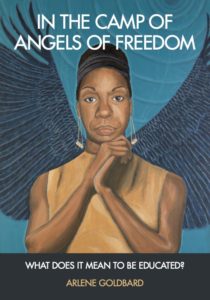The muscle in Goldbard’s memoir and acute thoughts on education lies in how it prompts. Prompts via words and images that narrate a story of making place for oneself and us; that generate the power of autodidacts, angels, and imagination to figure our lives together. It not only prompts but it teaches how to walk through the world with honesty, curiosity, and a drive for social justice. The North Stars of belonging, culture, and possibility that illuminate this wonderful book show us joys, struggle, and beauty in freedom. This book is a gift of emancipation.
Roberto Bedoya, Cultural Affairs Manager, City of Oakland, CA
Organizer, advocate, and artist Arlene Goldbard’s innovative autobiography is a dazzling chronicle of a life taking down elitism. Goldbard chartered her own autonomous course towards becoming the influential figure that she is in the world of community-based cultural advocacy; she encourages us to do the same, both in how we live and read and learn in our lives, and even in how we engage with her book. ~L.M. Bogad, The Progressive
In the Camp of Angels of Freedom offers important insights into the intersections of art, education, identity, and power in fresh, imaginative ways. I was struck by how Goldbard reimagines the wisdom of “her” angels in these times. This book is sure to provoke a great deal of conversation.
Makani Themba, Chief Strategist at Higher Ground Change Strategies
I thought often as I was reading about how much I would have liked using this book in a course I was teaching on the sociology of art, on communities, or just generally introducing students to thinking about how private lives are structured by institutions, history, politics, and social class. I learned a lot from reading this book; it’s beautifully written, carefully argued, truly a gift to the reader. I think it’s a rare book that sticks in your mind for a long time after getting to the last page. That’s my definition of compelling.
Betty Farrell, former Executive Director, Cultural Policy Center, University of Chicago
I’ve long admired Arlene Goldbard’s work on culture and democracy. Her latest book touches on those topics, but it’s driven by another passion, her outrage at the way education, which should be a social good, has become a profit center, and at the disrespect meted out to those with lived knowledge rather than formal credentials. She begins with entertaining and provocative stories of her own self-education, each chapter linked to a portrait she has painted of one of her “angels of freedom,” individuals whose work inspired and guided her path as an autodidact. The writing is clear and accessible, her challenges to social assumptions well worth considering. I highly recommend her insightful, refreshing perspective on values and systems that influence all our lives.
Judith Marcuse, LL.D. (Hon.)
Artistic Producer, Judith Marcuse Projects
Founder/Co-Director, International Centre of Art for Social Change (ICASC)
Senior Fellow, Ashoka International
Arlene Goldbard has trusted her curiosity, creativity and character through a lifetime of self-education, always in the service of the common good. In words and paintings, she honours her guiding angels with love and insight, defending the human spirit that labours for a shared emancipation. I’m filled with admiration for its originality and her courage in creating something unlike anything else. Her story of a woman’s path to wisdom is a training in fearlessness and a joy to read.
François Matarasso, community artist and author of ‘A Restless Art’
Arlene Goldbard has written an absorbing tender and inspiring reflection on the extraordinary people who have touched, illuminated, and guided her. In doing so with such humility and generosity she has invited us to pause and consider how our myriad threads of human interactions contribute to the fragile fabric of human society.
Gary Stewart, International interdisciplinary artist, Lecturer, Goldsmiths, University of London
An autodidact explores issues of education itself through essays and personal portraits of the key minds who influenced her
What does it mean to be educated? Through her evocative paintings and narrative, author and artist Arlene Goldbard has portrayed eleven people whose work most influenced her—what she calls a camp of angels. She sees each as a brave messenger of love and freedom for a society that badly needs “uncolonized minds.” Goldbard describes how the learning from each changed the course of her life in essays that offer generative moments of a life in art and social change. She also reveals ways a dominant society tried to put a first-generation American from a socially marginal family in her place—and failed.
Readers will learn about the author’s own self education, issues of formal higher education and its discontents, and the damage done by a society that prizes profits over people. Goldbard asks readers to consider the impact of credentialism on U.S. society and what we can do to set it right.
The “angels” whose work shaped Goldbard’s life are Henri de Toulouse-Lautrec, James Baldwin, Nina Simone, Paul Goodman, Doris Lessing, Alice Neel, Paulo Freire, Isaiah Berlin, John Trudell, Abraham Joshua Heschel, and Jane Jacobs. Despite their many differences, each had the gift of questioning assumptions, looking beneath surfaces, and imagining without bounds. The author invites readers to scrutinize their own educations and to honor their own angels.
Publisher: New Village Press
Distributor: NYU Press
Publication Date: January 24, 2023
Pages: 162
Trim: 7.00 x 10.00 inches
Illustrations: 15 Color illustrations
US Paperback Price: $34.95
ISBN: 978-1-61332-198-0
Also available in hardcover and eBook
